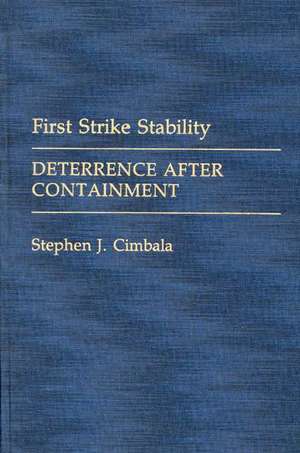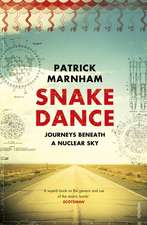First Strike Stability: Deterrence after Containment: Contributions in Military Studies
Autor Stephen J. Cimbalaen Limba Engleză Hardback – 23 aug 1990 – vârsta până la 17 ani
Din seria Contributions in Military Studies
- 24%
 Preț: 463.55 lei
Preț: 463.55 lei - 28%
 Preț: 438.00 lei
Preț: 438.00 lei - 24%
 Preț: 463.13 lei
Preț: 463.13 lei - 27%
 Preț: 438.59 lei
Preț: 438.59 lei - 28%
 Preț: 437.47 lei
Preț: 437.47 lei - 31%
 Preț: 437.84 lei
Preț: 437.84 lei - 28%
 Preț: 436.64 lei
Preț: 436.64 lei - 30%
 Preț: 556.53 lei
Preț: 556.53 lei - 30%
 Preț: 616.88 lei
Preț: 616.88 lei - 28%
 Preț: 435.88 lei
Preț: 435.88 lei - 30%
 Preț: 571.34 lei
Preț: 571.34 lei - 30%
 Preț: 592.75 lei
Preț: 592.75 lei - 38%
 Preț: 439.44 lei
Preț: 439.44 lei - 24%
 Preț: 461.52 lei
Preț: 461.52 lei - 28%
 Preț: 438.07 lei
Preț: 438.07 lei - 24%
 Preț: 461.87 lei
Preț: 461.87 lei - 28%
 Preț: 462.20 lei
Preț: 462.20 lei - 28%
 Preț: 362.29 lei
Preț: 362.29 lei - 30%
 Preț: 494.84 lei
Preț: 494.84 lei - 24%
 Preț: 463.97 lei
Preț: 463.97 lei - 24%
 Preț: 461.35 lei
Preț: 461.35 lei - 24%
 Preț: 463.72 lei
Preț: 463.72 lei - 37%
 Preț: 511.48 lei
Preț: 511.48 lei - 24%
 Preț: 460.43 lei
Preț: 460.43 lei - 28%
 Preț: 436.80 lei
Preț: 436.80 lei - 28%
 Preț: 436.40 lei
Preț: 436.40 lei - 28%
 Preț: 462.37 lei
Preț: 462.37 lei - 35%
 Preț: 458.04 lei
Preț: 458.04 lei - 28%
 Preț: 462.28 lei
Preț: 462.28 lei - 27%
 Preț: 463.38 lei
Preț: 463.38 lei - 27%
 Preț: 638.85 lei
Preț: 638.85 lei - 27%
 Preț: 465.68 lei
Preț: 465.68 lei - 24%
 Preț: 461.77 lei
Preț: 461.77 lei - 27%
 Preț: 439.17 lei
Preț: 439.17 lei - 27%
 Preț: 440.53 lei
Preț: 440.53 lei - 35%
 Preț: 460.76 lei
Preț: 460.76 lei - 28%
 Preț: 437.57 lei
Preț: 437.57 lei - 28%
 Preț: 468.66 lei
Preț: 468.66 lei - 24%
 Preț: 463.64 lei
Preț: 463.64 lei - 24%
 Preț: 464.57 lei
Preț: 464.57 lei - 23%
 Preț: 492.54 lei
Preț: 492.54 lei - 24%
 Preț: 462.87 lei
Preț: 462.87 lei - 27%
 Preț: 465.68 lei
Preț: 465.68 lei - 27%
 Preț: 439.51 lei
Preț: 439.51 lei - 27%
 Preț: 346.25 lei
Preț: 346.25 lei - 27%
 Preț: 500.43 lei
Preț: 500.43 lei - 27%
 Preț: 617.60 lei
Preț: 617.60 lei - 18%
 Preț: 355.91 lei
Preț: 355.91 lei - 27%
 Preț: 682.72 lei
Preț: 682.72 lei - 28%
 Preț: 362.72 lei
Preț: 362.72 lei
Preț: 437.47 lei
Preț vechi: 707.57 lei
-38% Nou
Puncte Express: 656
Preț estimativ în valută:
83.71€ • 87.63$ • 69.26£
83.71€ • 87.63$ • 69.26£
Carte tipărită la comandă
Livrare economică 05-19 aprilie
Preluare comenzi: 021 569.72.76
Specificații
ISBN-13: 9780313274480
ISBN-10: 0313274487
Pagini: 232
Dimensiuni: 156 x 235 x 14 mm
Greutate: 0.5 kg
Ediția:New.
Editura: Bloomsbury Publishing
Colecția Praeger
Seria Contributions in Military Studies
Locul publicării:New York, United States
ISBN-10: 0313274487
Pagini: 232
Dimensiuni: 156 x 235 x 14 mm
Greutate: 0.5 kg
Ediția:New.
Editura: Bloomsbury Publishing
Colecția Praeger
Seria Contributions in Military Studies
Locul publicării:New York, United States
Notă biografică
STEPHEN J. CIMBALA is a Professor of Political Science at Pennsylvania State University. He is the author of many works in military studies, including Strategic Impasse: Offense, Defense, Deterrence Theory and Practice (1989) and Nuclear Endings, Stopping War on Time (1989). He is a member of the Inter-University Seminar on Armed Forces and Society, International Studies Association, Arms Control Association, and other professional organizations in the field of defense studies.
Cuprins
IntroductionFirst Strike Stability: The Concept and Its Policy ImplicationsThe State of Nature and First Strike StabilityThe New Soviet Thinking and First Strike StabilityAlliances, Deterrence, and the Control of Escalation: Dynamic StabilityDeterrence Failure and Conflict TerminationMissile Defense, Stability, and the State of NatureConclusion: Nuclear Deterrence and Stability after ContainmentSelected BibliographyIndex








